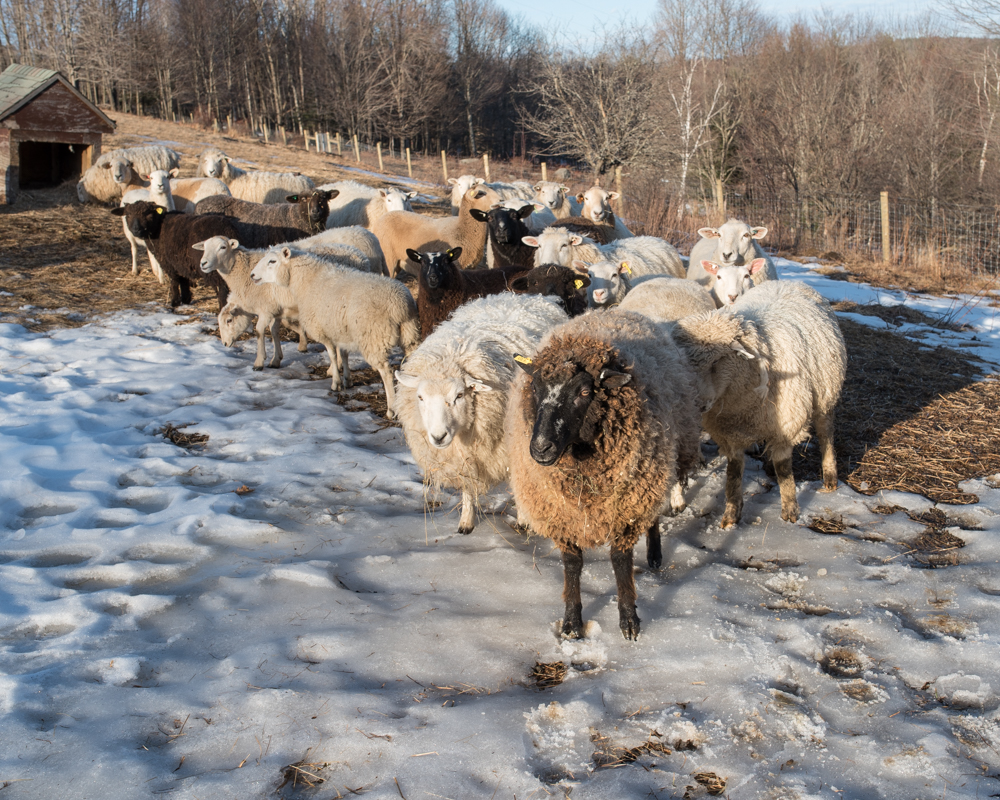 Three days ago I made a passing reference to the brown ewe pulling a fast one on me, and then went on to conclude that she had not yet lambed. Veering toward solipsism, I decided later that it might be worth checking if the ewe was in fact still pregnant. Her udder was gone; she was clearly no longer pregnant, so where was her lamb? And so began a macabre Holmesian inquiry.
Three days ago I made a passing reference to the brown ewe pulling a fast one on me, and then went on to conclude that she had not yet lambed. Veering toward solipsism, I decided later that it might be worth checking if the ewe was in fact still pregnant. Her udder was gone; she was clearly no longer pregnant, so where was her lamb? And so began a macabre Holmesian inquiry.
The week started with my finding Bravo snacking on the trailing half of a black lamb. I assumed that the lamb had been born the previous night and Bravo had done it in. I was a little unsettled by the fact that none of the ostensibly pregnant ewes in the pasture looked like they had recently given birth, or seemed distraught about having just lost their lamb. I convinced myself that their equanimity was attributable to lack of maternal instinct in first-time mothers, but this didn’t explain the absence of blood. Things got more complicated on Wednesday when Bruce crutched the flock: we got a good look at all the potential sources of the mystery lamb, and none looked anything like a ewe who had recently given birth, and in fact most showed no visible signs of pregnancy. The only possible source of the lamb, one of the Dorset-Border Leicester crosses, was very unlikely to have produced a black lamb for genetic reasons. I was almost ready to resort to supernatural explanations at this point.
When I realized that the brown ewe was no longer carrying her lamb, I jumped to the conclusion that Bravo was a lamb-killer twice over. It seemed clear that my urgency on that late-January day was well-taken but tardy — the brown ewe had lambed outside before we got her into the barn, and Bravo had gotten to the lamb before I found it.
When I shared all these threads of the story with Bill, he came up with a coherent and satisfying explanation that tied everything together. He suggested that Monday’s lamb breakfast was not a newly born lamb from the previous night, but rather the lamb delivered by the brown ewe in January. Bravo had either deliberately cached part of that lamb or lost it in a subsequent snow drift, and re-found it Monday morning. The cold conditions we’ve had since late January explain the fact that the lamb seemed recently killed, and Bill’s explanation fit with the fact that we couldn’t find a plausible mother of a Sunday-born lamb.
After convincing myself that I had lost 2 lambs to my guardian dog, I was almost happy to learn that it was probably just one. And I was enormously relieved that my instincts were somewhat vindicated, both my belief that the brown ewe was imminently lambing in late January, and that none of the ewes currently on pasture were close. A bad outcome from circumstances I was aware of feels less damning than getting blindsided.
Wednesday’s crutching confirmed that two of the ewes are somewhat close to lambing, and we plan to move them into the barn on Sunday. Today, to make some room, I led the brown ewe back to the big group on pasture, and she was received like a celebrity. Not every ewe gets to star in her own true crime drama…

Tagged: barn, bravo, brown ewe, dead lamb, ewe, Hollow Oak Farm, livestock guardian dog, mortality, pasture, sheep, true crime
Wonderful sleuthing and clever Bravo!
Great to hear from you, David! So if we get the 2 imminent lambers moved on Sunday, Bravo’s only source of lambs will be the supernatural powers whom LGDs worship. I plan to let him rejoin the flock, with fingers crossed, though he may be burdened with an impediment to chasing sheep…